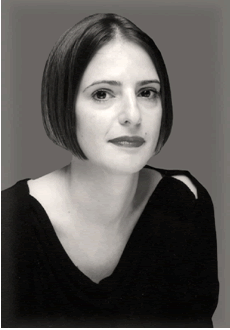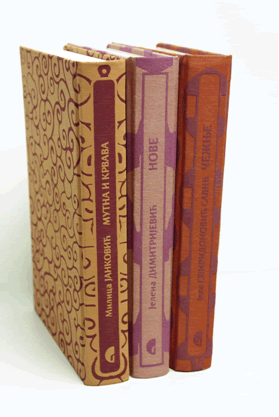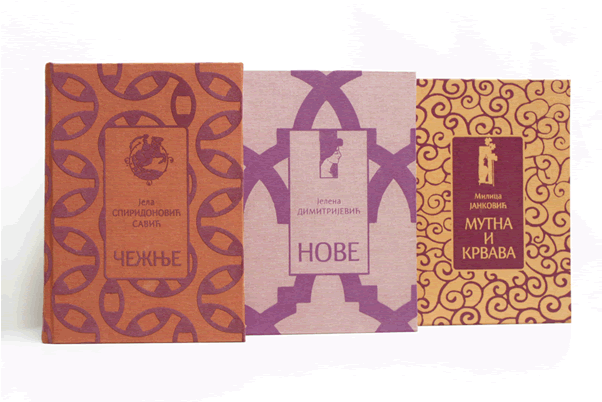 Nataša Marković is a member of the Editorial Board of Službeni glasnik, one of the biggest and most significant publishing houses in Serbia and multiple award winner on the International Belgrade Book Fair. Službeni Glasnik has initiated Sopstvena soba series, an edition dedicated to literature written by women authors. The series is named after Virginia Woolf's essay A Room of One's Own, which is considered a classic in feminist literary critique. Just before the latest Belgrade Book Fair, Nataša Marković and Glasnik presented three recently published books of the edition, which discovered the forgotten Serbian female writers who created at the beginning of the 20th century.
Nataša Marković is a member of the Editorial Board of Službeni glasnik, one of the biggest and most significant publishing houses in Serbia and multiple award winner on the International Belgrade Book Fair. Službeni Glasnik has initiated Sopstvena soba series, an edition dedicated to literature written by women authors. The series is named after Virginia Woolf's essay A Room of One's Own, which is considered a classic in feminist literary critique. Just before the latest Belgrade Book Fair, Nataša Marković and Glasnik presented three recently published books of the edition, which discovered the forgotten Serbian female writers who created at the beginning of the 20th century.
How did you come up with the idea to publish the Sopstvena soba edition? Was it difficult to initiate that project?
At the beginning of 2011, the Editorial Board of Glasnik got an approval from the Managing Board to create a series dedicated to belles-lettres, which was not a part of Glasnik’s publishing production at the time. Consequently, the editors were given the task to create a concept of the edition, as well as the related publications. Being familiar with the affinities of Glasnik’s editors – Jovica Aćin, Gojko Tešić, Branko Kukić and Goran Petrović – as well as with the publishing scene in Serbia, I realized that the series dedicated to women’s literature seemed like the only meaningful idea. It turned out that Gojko Tešić had also considered the same idea, and precisely prior to the editorial meeting the two of us agreed that exactly that kind of series was the only sensible solution. I cannot say that it was difficult to initiate the Sopstvena soba edition, since Glasnik is a kind of publishing house which truly nurtures editor’s autonomy, but I must admit that the launching of the series was followed by detailed explanation of its importance for our culture and for Glasnik. Gojko Tešić supported it passionately and his help was crucial.
Do only women participate in this project, and why?
As the authors – yes, only women can occupy that kind of position in Sopstvena soba. Any other position – such as translator, literary interpreter, copyeditor and technical editor – is open for men who are able to recognize women’s literature.
 The series is named Sopstvena soba (A Room of One's Own) after Virginia Woolf’s renowned essay. Are you trying to defend women’s right to write by publishing these books, just like the author of the essay did?
The series is named Sopstvena soba (A Room of One's Own) after Virginia Woolf’s renowned essay. Are you trying to defend women’s right to write by publishing these books, just like the author of the essay did?
I’d like to believe that Virginia Woolf has already managed to defend that right along with a number of her followers and our predecessors. Otherwise we wouldn’t have such a vast and significant literary heritage written by female writers. If our generation were expected to protect anything, it should be to preserve women’s literature from oblivion and help it establish a significant place in the history of literature. It seems that women’s literature holds a much better rank in the history of world literature, so our task here and now is somewhat more important and more demanding. The battle is ours, after all, and we shouldn’t expect anyone else to fight it.
What kind of publishers’ attention has been paid to female literary tradition in our country so far?
The Knjiženstvo project asserts that there were serious attempts to dedicate proper attention to women’s literature back in the 19th century. The fact that our culture lacked proper infrastructural mechanism that could make these efforts more efficient is another issue. It seemed that the situation had improved a bit at the end of the 20th century, so my generation had the honour to be raised on publications such as ProFemina and Genero. Even then some publishing houses had series dedicated to literature written by female writers. The problem was that only a few of them were actualised due to well-known reasons. But, it’s truly a pity that our culture hadn’t matured earlier and introduced us to the blue-clothed Collected works of Virginia Woolf or red-clothed Collected works of Jelena Dimitrijević, the type of hard-covers Tolstoy and Chekov had in the mid-20th century. It appears that we lack that kind of institutionalization of women’s literature; therefore I consider it very important that Glasnik, as one of the biggest publishers today, has produced the Sopstvena soba edition.
Which Serbian authors were included in the series?
So far, the collected works of Anđelija L. Lazarević were published in the book Govor stvari edited by Zorica Hadžić; novel Nove by Jelena Dimitrijević; selected works of Jela Spiridonović Savić, edited by Jovana Reba; novel Mutna i krvava by Milica Janković. Currently, we are preparing selected works of Milica Kostić Selem (edited by Mirjana D. Stefanović) and the unpublished prose of Milka Žicina (edited by Radmila Gikić Petrović).

Series also encompasses a number of works written by foreign female authors. Could you list a few titles?
Since 2011, we’ve published Buđenje (The Awakening) by Kate Chopin, translated by Gordana Korać. We are planning to publish Izlet na pučinu (The Voyage Out) by Virginia Woolf, translated by Lazar Macura; Žuti tapet i druge priče (The Yellow Wallpaper) by Charlotte Perkins Gilman, translated by Zoran Skrobanović and novel Doba nevinosti (The Age of Innocence) by Edith Wharton, translated by Nađa and Milan Komnenić.
What were the criteria for selection?
Concerning foreign authors, it was of utmost importance to give advantage to the works which marked the turning point in the history of female literature. Therefore, the famous novel The Awakening was the first book of Sopstvena soba, and it will be followed by the first novel of eminent V. Woolf and the exceptional The Yellow Wallpaper. On the other hand, when we had to make a selection of Serbian authors, certain editorial perplexities appeared, mostly concerning the question of what to publish first, since there was a large number of works waiting to be unveiled from the oblivion. In that sense the first two books in Sopstvena soba included Serbian authors whom I found significant enough to be once again represented to the readers, in order to remind them that Serbian literature contained several marvellous works created by marvellous women.
Why have these female Serbian authors remained almost forgotten, in your opinion? Do you believe this series will help change the situation?
Maybe it would be better, for pedagogical reasons, to be more direct and say that certain Serbian female authors who marked the 20th century remained completely forgotten. The fact that some researchers specialized in particular and often very narrow areas are acquainted with their work, does not make these authors famous, nor does it mean that the reading public has any knowledge of them. There are countless reasons why it is so. Common denominator of all the reasons is negligence; we often neglect our own cultural tradition. The intelligent and talented women writers are not the only victims of that negligence; numerous other significant people in Serbian culture suffered the same neglect. It is always unthankful to measure who suffered more injustice, but I believe that we can all agree that the literature written by women in Serbia was wrongfully neglected. If Glasnik’s Sopstvena soba mannages to correct this injustice, the edition will fulfil its purpose.
Have the books received a broad response among the readers, not only among the gynocritical researchers and experts?
Unfortunately, we cannot say that the books published in Sopstvena soba have become bestsellers, but it is obvious that the interest exists and that it is beyond the narrow circle of devoted gynocritical researchers. Of course, I would like to see each of Sopstvena soba books published in a number of editions, but I don’t believe that these expectations are realistic. It is important that these books become recognized as good literature, and good literature finds its way to the readers sooner or later.
Is publishing able to contribute to women’s literature and raise awareness of the importance of female authorship and female perception of the world, and should it do so?
It is difficult to claim that any institution or profession has a quest to raise awareness of anything in the time of liberal capitalism boost. Difficult, but also necessary. It is important to be aware of the values, and to have the institutions, professions and individuals that will make sure these values are promoted. I believe that publishing is an industry that must never forget its fundamental mission – the promotion of quality – even though publishing is becoming more and more influenced by the laws of the market. I’d like to think that quality also implies responsibility to present proper values, especially the ones repressed by the historical injustice.
What are your plans for the future of Sopstvena Soba?
I would like this series to be long-lasting because it is the only way to complete the spacious mansion of our prose art with female authors’ rooms of one’s own, which will make it magnificent. The works themselves, as well as the afterwords and chronological overviews of the female authors’ lives and works, that can be found in every book published in Sopstvena soba, testify that. If its works and the following critical apparatus could set in motion new and further studies of female literature, its future will be as I imagined it.
Photos by permission of Nataša Marković and Službeni glasnik
